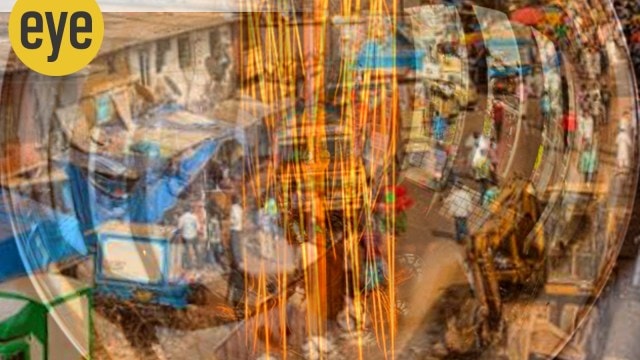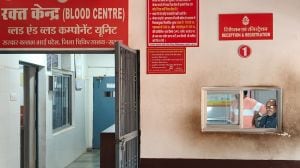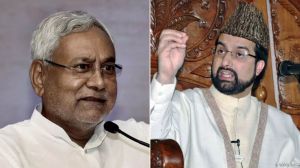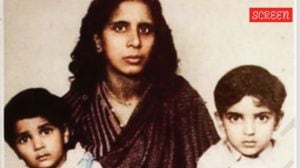Finding hope in the monsoon: When the sky breaks open, so do we
There’s a line in Kafan where the two grieving, indifferent men—father and son—sit outside a liquor shop, having spent the shroud money on drink. But Premchand leaves us with this question: Who decides what grief should look like, when the system itself is so cruel that the living envy the dead?
 A heartfelt reflection on kindness, resilience, and connection during challenging times. (Credit: Suvir Saran)
A heartfelt reflection on kindness, resilience, and connection during challenging times. (Credit: Suvir Saran)It started with a cup of chai and a pair of trembling hands.
I was standing beneath a leaking tarpaulin at a roadside stall in Mumbai. The monsoon had come down like grief—thick, unrelenting. A man in his seventies stood next to me, soaked to the bone, trying to shelter a parcel wrapped in newspaper from the rain. He looked like someone who didn’t complain often. I offered him space, and without a word, he handed me the second cup of chai the vendor had poured, unasked.
We drank in silence, rain pounding around us like war drums. After a while, he said, “It’s for my daughter. She lives far. I’m sending her papads—she still loves these.”
And then he added, “You know, we don’t talk much. But sending something homemade feels like a way to speak.”
That’s it. No epiphany. No viral video moment. Just a father in a flood, sending papads like poetry.
And I thought—this is what saves us.
Not machinery. Not cleverness. But kindness. What Chaplin once called for in a time of terror and tension.
We are again in such a time.
We live in a world strapped to screens, unspooling with war, AI hallucinations, vanishing glaciers, and men who speak of bombs like boardroom strategies. We are all trying to hold on. Our connections have thinned to emojis and updates. The skies are hotter, the news colder. What do we do?
We reach for each other.
We send papads across miles. We share umbrellas with strangers. We light diyas during Diwali and remember that even in darkness, we are meant to glow.
Some days, I think of the Middle East, the horror playing on loop. Mothers clawing at rubble. Children waking to the sound of drones instead of dreams. And I wonder, what can one person do in the face of such vast, systemic violence?
And then I remember Faiz.
“Bol, ke lab azaad hain tere…”
Speak, for your lips are free.
So I write. I smile. I speak gently even when the world roars. Because the opposite of destruction isn’t silence—it is tenderness. It is memory. It is the courage to stay human in inhuman times.
We forget this.
We are told to optimise, accelerate, gamify. But no algorithm has ever felt the way a child feels when her kite lifts into a grey sky, tugging like a prayer.
No artificial intelligence has wept listening to Meera’s longing or Kabir’s couplets—
“Prem gali ati saankari, ta mein do na samai.”
(The lane of love is narrow. Two cannot walk it together.)
You cannot march through kindness. You must yield. Shrink your ego. Make room.
I remember one Eid, post-pandemic, when I visited a friend in Lucknow. The city was still wrapped in cautiousness, masks half-on, hearts half-hopeful. She lived alone, her family across borders too tangled to traverse. And yet, that night, her little dining table overflowed—she’d cooked biryani for the neighbours, she’d lit candles for those we lost, and she’d printed tiny Urdu couplets for each guest.
Mine read:
“Dard ka hissah hai sabhi ko milta, magar har shakhs usay samajhta nahi.”
(Suffering touches us all, but not everyone understands it.)
That’s what acts of kindness do—they make us understand each other better.
Now, during this monsoon, I hear the rains and I think of renewal. The same clouds that flood also feed. The same water that drowns also cleanses. Nature, in her fury, reminds us: everything is cyclical. Even despair.
And so is love.
This Onam, I watched an elderly couple, both in white mundus, laying out a floral pookalam outside their flat. No one else had decorated the building that year. But they laid out that pattern with the care of cartographers—petal by petal, shape by shape—until the ground bloomed with symmetry and scent.
When I asked them why they still do it, the woman said, “Because even if no one watches, beauty must be built.”
That stayed with me.
And in moments when the weight of the world feels unbearable—when forest fires crackle through continents, when cities gasp in smoke, when boys with guns become gods—I return to such words.
“Kindness,” as I once heard someone say, “is not a trait. It is a decision.”
And it is one we must keep making.
Every time you offer your seat. Every time you forgive too soon. Every time you remember someone’s favourite song. Every time you hold space, not opinion.
These are small rebellions. And they matter.
Sometimes, when the noise is too much, I turn to the poets.
Raskhan, the Sufi who found his home in the arms of Krishna, writes:
“Prem bhakti jahan, lekh na jānā; jahan dekha tām gayo samānā.”
(Where there is love and devotion, I lose all need for logic—where I find that, I dissolve.)
Here was a Muslim poet in 16th-century India, so overcome by the sheer beauty of Krishna’s love, that he wandered Mathura not as a convert, but as a seeker. No border in him. No division. Just longing, just love. If he could find his god in the cowherd’s flute, why can’t we find ours in each other’s eyes?
What a contrast to now, when borders are drawn in blood and belief, when identity is wielded like a weapon.
In Delhi, a week ago, a young sanitation worker told me quietly, “Sab kaam hum karte hain, par koi haath milane ko bhi taiyar nahi.”
(We do all the work, yet no one is willing to shake our hand.)
And I thought of Mulk Raj Anand’s Untouchable, how his Bakha walked the world with his spine curved from shame, not labour. That was 1935. This is 2025. What has changed?
Not enough. But not nothing.
The difference is: we see more now. We speak more. We shame silence.
Even in that moment, a young college student passing by, overheard, stopped, and shook the man’s hand. They didn’t speak. They didn’t need to. That simple gesture shattered centuries.
And then there’s Rahim, the noble who wrote couplets that sounded like lullabies for the soul:
“Rahiman paani raakhiye, bin paani sab soon; paani gaye na ubere, moti, manas, choon.”
(Preserve water, Rahim says—for without it, all is barren; without water, pearls, people, even lime perish.)
What is this water, if not kindness? Grace? The ability to look at another person and recognise yourself?
Even now, we are drying out—not for lack of rainfall, but lack of empathy. What will sustain us, if not the water of mercy?
Maithili Sharan Gupt once wrote:
“Nar ho, na nirash karo man ko; kuch kaam karo, kuch kaam karo.”
(You are human, do not despair—do something, act.)
His voice comes to me now not as command, but comfort. Don’t be paralysed by the world’s pain. Touch one life. Change one story. That’s enough for today.
That’s how we build the future—not with grand declarations, but with small acts strung like prayer beads.
The tea shared in the rain. The papad sent with love. The table set for neighbours during Eid. The pookalam laid with faith, even when no one is watching.
These aren’t just gestures. They are resistance.
They are how we say: I see you. I choose you. You are mine.
And then, sometimes, I turn to Premchand.
When the news becomes unbearable, when we witness another child with no home, no school, no shield from hatred or hunger, I think of Hamid, that little boy in Eidgah, who had just three paisas and still chose to buy tongs for his grandmother instead of sweets for himself. What is that, if not the purest act of love?
Premchand didn’t romanticise suffering. He wrote it in bone and blood. But through all his stories—Godaan, Kafan, Poos ki Raat—there is a thrum of decency, of moral resistance, of the dignity that clings even to broken lives like jasmine to a crumbling wall.
There’s a line in Kafan where the two grieving, indifferent men—father and son—sit outside a liquor shop, having spent the shroud money on drink. It’s brutal. But Premchand leaves us with this question: Who decides what grief should look like, when the system itself is so cruel that the living envy the dead?
And yet, even in that story, there is something urgent beneath the irony: a longing for a world that doesn’t let the poor die in neglect.
That longing is still ours.
It echoes today when gig workers deliver our meals during storms. When farmers protest in sun and smog, unheard. When a little girl walks miles to school and still tops her class.
We are surrounded by small Premchand stories every day—if only we choose to look.
He once wrote:
“Insaan ka asli dharm hai doosre ki seva karna. Bas. Baaki sab to dhong hai.”
(The true religion of man is to serve others. Everything else is a charade.)
That sentence has haunted and steadied me.
In a world gasping under the weight of identity, ideology, and algorithm, what could be more revolutionary than service without pride? What could be more radical than kindness without audience?
If we have forgotten, let us remember.
Let us make our living, loving, and writing a kind of service.
A cup of chai. A papad. A poem. A phone call. A protest.
These are not nothing. These are how we begin again.
And like Premchand’s stories, let us not seek to erase sorrow—but to stand inside it, shoulder to shoulder, and say: you are not alone.
Because when one heart opens, others do too.
When the sky breaks open, yes, it may flood. But it also feeds.
So today, let’s reach out. Share something homemade. Smile at the stranger. Hold someone’s story in your hand without fixing it. Send that message. Forgive where you can. Speak softly. And when you feel the world is too much—look up. The clouds may be dark, but they are moving.
Always, always moving.
- 01
- 02
- 03
- 04
- 05































